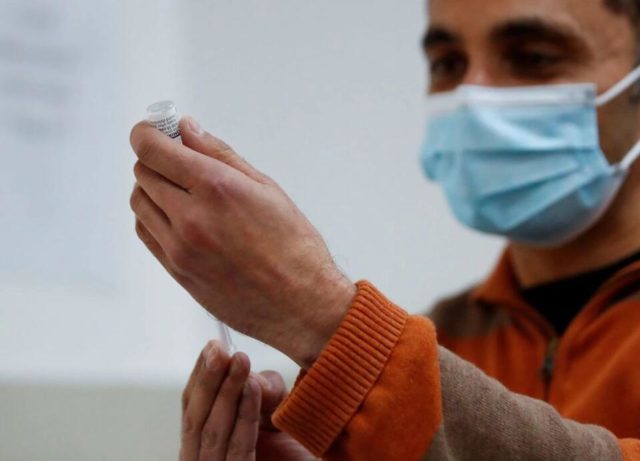British researchers said on Wednesday they had identified proteins in the coronavirus that are recognised by T-cells of people who are exposed to the virus but resist infection, possibly providing a new target for vaccine developers.
By Alistair Smout
LONDON – British researchers said on Wednesday they had identified proteins in the coronavirus that are recognised by T-cells of people who are exposed to the virus but resist infection, possibly providing a new target for vaccine developers.
Immunity against Covid-19 is a complex picture, and while there is evidence of waning antibody levels six months after vaccination, T-cells are also believed to play a vital role in providing protection.
The University College London (UCL) researchers examined 731 health workers in two London hospitals during the first wave of the Covid-19 pandemic, and found that many had not tested positive despite likely exposure to the original coronavirus.
They found that, while a subset of the workers did not generate antibodies or test positive with PCR tests, they had still generated a large and broad T-cell response following possible exposure.
This suggests that rather than the workers avoiding exposure to the coronavirus altogether, the T-cells had cleared the virus before there were any symptoms or positive test result – a so-called “abortive infection”, the researchers said.
“We know that some individuals remain uninfected despite having likely exposure to the virus,” said Leo Swadling, lead author of the study, which was published in science journal Nature.
“What is really informative is that the T-cells detected in these individuals, where the virus failed to establish a successful infection, preferentially target different regions of the virus to those seen after infection.”
Current vaccines, which provide high protection against severe disease but do not fully stop transmission or re-infection, target the spike protein of the coronavirus.
In contrast, the T-cell responses that led to abortive infections in the UCL study recognised and targeted instead “replication proteins”.
The researchers said that while such T-cells were associated with protection from detectable infection, they were not necessarily sufficient for protection alone, and the study did not look at whether people had protection on re-exposure.
They added that the replication proteins are among the least changed by mutations to coronaviruses, and exposure to other coronaviruses may be one reason why some of the health workers were able to mount such quick T cell responses.
It also means that a vaccine which targeted these proteins in addition to the spike protein should work against a broad range of coronaviruses including the currently dominant Delta variant, the researchers said.
“This is a strong rationale for including these proteins to supplement spike in next-generation vaccines,” Swadling told reporters.
– REUTERS








